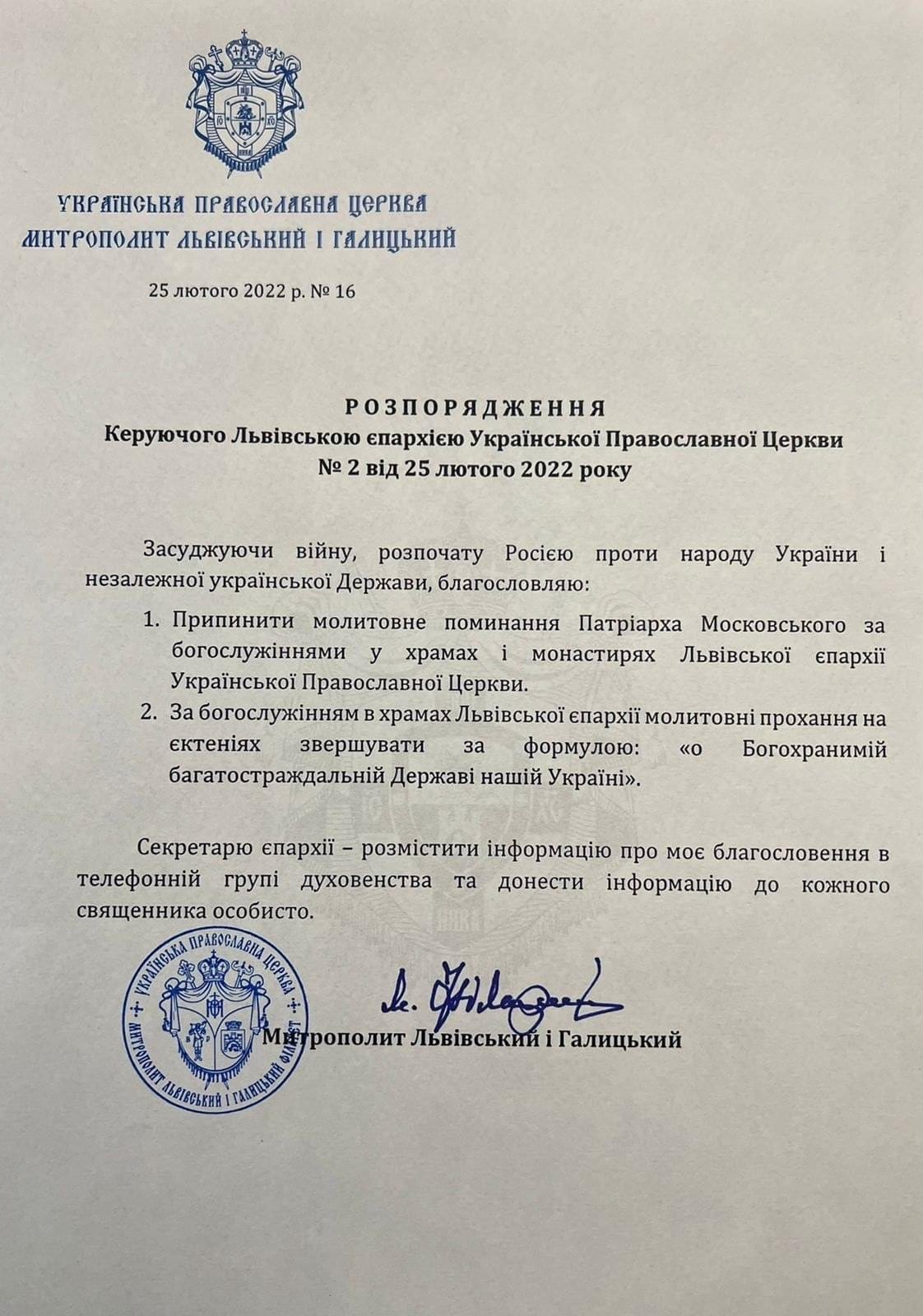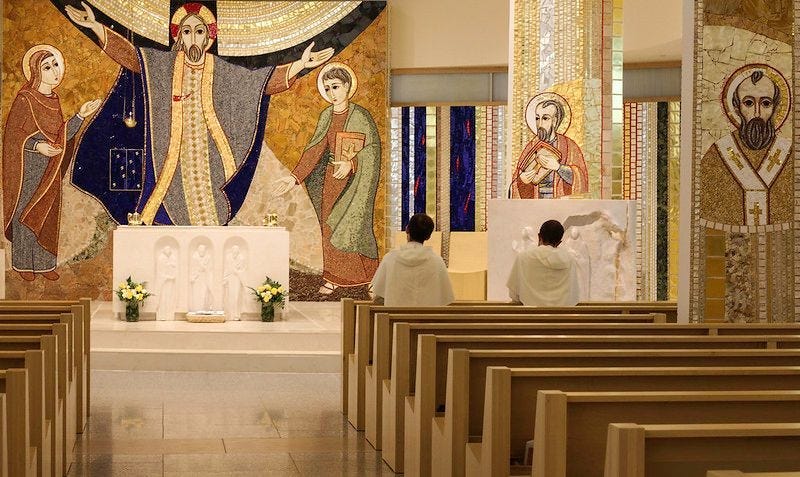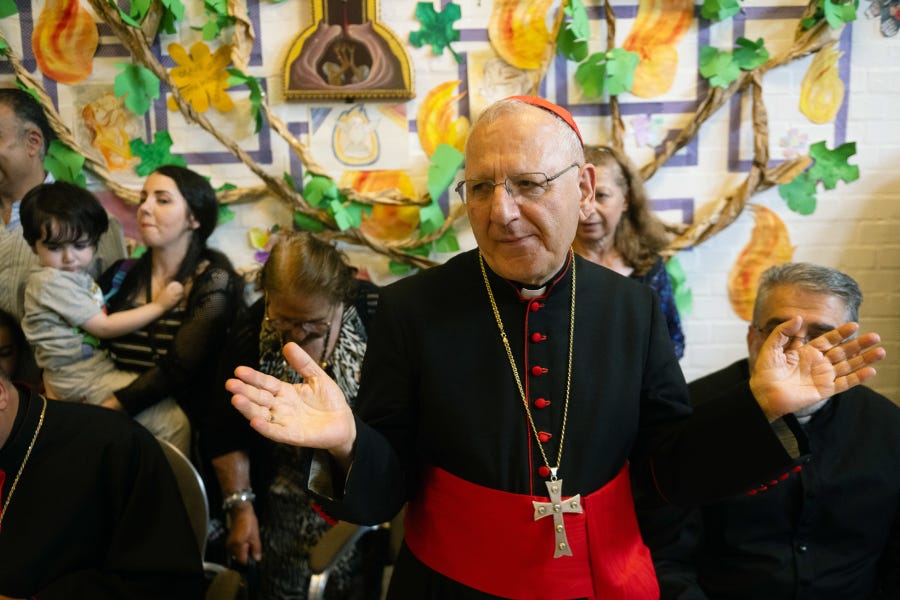A new schism has emerged among Orthodox leaders in Ukraine, after at least two bishops instructed priests to stop recognizing the Patriarch of Moscow in the prayers of the Eucharistic Divine Liturgy.
The Moscow patriarch said Tuesday the bishops’ decision amounts to schism, opening a new fracture among Ukrainian Orthodox believers, who were already divided over their relationship to Patriarch Kirill of Moscow.
In the chaos of war, the loyalties and alliances of Ukraine’s Orthodox bishops have also been thrown into chaos, as the map of Orthodoxy in Ukraine is undergoing real-time and often ambiguous revisions. The landscape will likely continue to shift as Russian hostilities in the country perdure.
“The termination of the commemoration of the Primate of the Church, not because of doctrinal or canonical errors, or delusions, but because of discordance with certain political views and preferences, is a schism, for which anyone who commits it will answer before God, not only in the age to come, but also in the present,” Patriarch Kirill of Moscow wrote March 2 to an archbishop of the Ukrainian Orthodox Church, which is governed by Kirill.
The statement came after Metropolitan Archbishop Evlogy of Sumy, a city in eastern Ukraine, instructed his priests Monday to discontinue prayers of communion with Kirill in the Divine Liturgy, or celebration of the Eucharist.
Schism is the refusal of submission to the authority of a legitimate religious authority, or refusal of communion, or unity, within a church body.
Evlogy’s decision is understood to be a repudiation of Kirill’s leadership. It came after the Russian Orthodox patriarch issued prayers Sunday that seemed aimed at theologically justifying Russian President Vladimir Putin’s invasion of Ukraine.
But the Sumy Orthodox archbishop said in a statement March 2 that directing priests to stop praying liturgically for Kirill is not an act of schism. Evlogy wrote that he remains in communion with Kyiv Metropolitan Onufriy, leader of the Ukrainian Orthodox Church under Kirill’s jurisdiction.
Evlogy’s statement did not mention Kirill, the archbishop insisted only that he and his diocese “condemn any schism and heresy.”
The archbishop did not explain how he could remove reference to the Moscow primate from the liturgy without effecting a schism.
Evlogy is not the only Ukrainian Orthodox bishop to instruct his priests to stop praying for Kirill in the Divine Liturgy.
Metropolitan Bishop Halych Filaret Kucherov of Lviv, in western Ukraine, directed his priests on Feb. 25, one day after the invasion began, to stop recognizing the Moscow patriarch in the liturgy. The bishop’s decree became public in Ukraine only on March 2, one week after it was issued.
Kurcherov told his priests to pray for peace in Ukraine during the Divine Liturgy, instead of praying for Kirill.

Russian Orthodox Patriarch Kirill faced widespread criticism in the months leading up to the Russian invasion of Ukraine. That criticism intensified, and became more pointed within the Orthodox Church under his governance, after the archbishop’s remarks Sunday.
“We must not let dark and hostile external forces laugh at us, we must do everything to maintain peace between our peoples and at the same time protect our common historical Fatherland from all outside actions that can destroy this unity,” Patriarch Kirill said in an address, after a Feb. 27 Divine Liturgy at Moscow’s Orthodox Cathedral of Christ the Savior.
Kirill claimed there is an essential unity between Russia and Ukraine, and the Orthodox Christians in those countries.
“God forbid that the current political situation in fraternal Ukraine, which is close to us, should be aimed at ensuring that the evil forces that have always fought against the unity of Russia and the Russian Church gain the upper hand,” the patriarch said.
While the patriarch went on express solidarity with the Christians of Ukraine, he insisted that solidarity means accepting Moscow’s authority over Ukrainian Orthodox believers, and their bishops.
Kirill also said directly that in a spiritual and cultural sense, “Russia” includes the modern political states of Russia, and Ukraine, and Belarus —seeming to justify Putin’s rationale for invading Ukraine.
While Ukraine fights to repel a Russian invasion of the country, the president of Belarus is generally regarded by foreign policy analysts as a Putin lackey.
Kirill’s declaration of schism against Ukrainian Orthodox bishops Tuesday would seem to answer in the negative a request from the Holy Synod of Ukrainian Orthodox bishops — the Ukrainian Church in alignment with Moscow, under the authority of Kirill — which asked the patriarch directly to intervene for an end to the invasion.
“Your Holiness! We ask you to intensify your prayer for the long-suffering Ukrainian people, to say your First Hierarch’s Word on the cessation of fratricidal bloodshed in Ukrainian land and call on the leadership of the Russian Federation to immediately stop hostilities that are already threatening to turn into a world war,” the synod requested on Monday.
Orthodoxy is the majority religion of Ukraine; more than 65% of the country’s population identify as Orthodox Christians.
But Orthodox believers in Ukraine are split between the Ukrainian Orthodox Church, which is subject to Kirill’s governance, and the Orthodox Church of Ukraine, which was in 2018 recognized as autocephalous, or self-governing, by the Patriarch of Constantinople.
The self-governing Orthodox Church of Ukraine has nearly twice the membership of the Ukrainian Orthodox Church, which is tied to Moscow.
Constantinople’s 2018 recognition of the independent Orthodox Church of Ukraine has caused a schism in the worldwide Orthodox communion, as Moscow, under Kirill’s leadership, broke from communion with Constantinople over the recognition. The Moscow patriarchate claims Ukraine as an inseparable part of its own territory and insists that it is a dependent ecclesiastical province of the Russian Church.
There is no single governing figure in Orthodox Christianity, which consists mostly of self-governing Churches legitimatized by mutual recognition or communion with one another. But the Patriarch of Constantinople is regarded as the spiritual leader of Orthodoxy and the “first among equals” among the heads of the world’s Orthodox Churches.
For his part, Ecumenical Patriarch Bartholomew I of Constantinople said Tuesday that Ukrainian Orthodox bishops subject to Kirill’s leadership “see [Kirill] as the religious leader of the enemy country. They are gradually moving away from [the Russian Orthodox] Church and joining the new, autocephalous Church.”
‘We are not very happy about this, because it is the result of war. We would like the Russian Church not to show such hostility towards me and to accept our canonical decision,” regarding the Orthodox Church of Ukraine, Bartholomew said.
Neither the archbishop of Sumy nor Lviv, now seemingly regarded by Kirill as schismatic, his indicated he will formally join his diocese to the self-governing Orthodox Church of Ukraine. And Evlogy’s statement Tuesday suggests his bishop has no intention to do so, despite his break from communion with Kirill.
As schism unfolds in Ukraine, more than 250 Russian Orthodox clerics have signed this week an open letter urging “the cessation of the fratricidal war in Ukraine depends, with a call for reconciliation and an immediate ceasefire.”
“We remind you that the life of every person is a priceless and unique gift of God, and therefore we wish the return of all soldiers - both Russian and Ukrainian - to their homes and families safe and sound,” the priests wrote.
“We think bitterly about the abyss that our children and grandchildren in Russia and Ukraine will have to overcome in order to once again begin to be friends with each other, respect and love each other.”
“We remind you that the gates of paradise are opened to anyone, even a person who has seriously sinned, if he asks forgiveness from those whom he humiliated, insulted, despised, or from those who were killed by his hands or at his orders.”
“There is no other way but forgiveness and mutual reconciliation.”
Ed. note: This story is developing and has been updated.



